Key takeaways:
- Personal essays foster empathy and self-discovery by transforming individual experiences into relatable narratives that connect with readers.
- Common themes in personal essays include resilience, identity exploration, and the impact of relationships on personal growth.
- Effective storytelling relies on strong character development, a clear narrative arc, and vivid imagery to engage readers emotionally.
- Choosing a compelling topic involves reflecting on significant moments, embracing vulnerability, and identifying personal passions to enhance authenticity in writing.
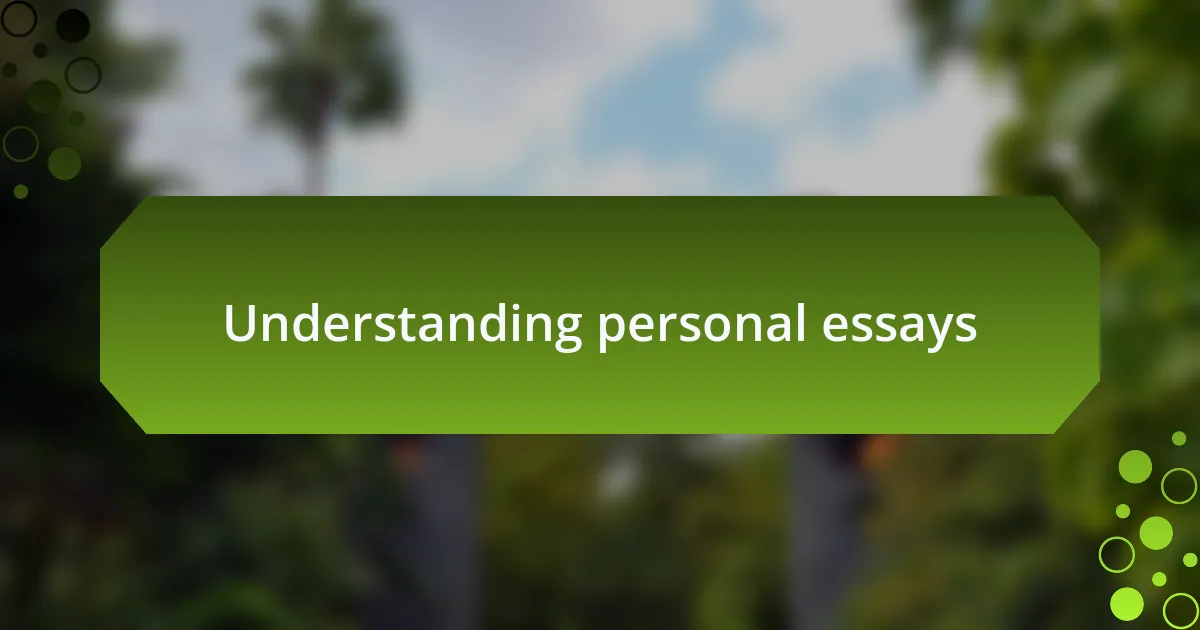
Understanding personal essays
Personal essays are unique reflections of our experiences and emotions. They often delve into our thoughts during significant moments in life, allowing us to connect with readers on a deeper level. Have you ever found yourself revisiting a cherished memory? That’s the beauty of personal essays—they transform ordinary experiences into relatable narratives.
What strikes me most about writing personal essays is the vulnerability involved. Sharing our innermost feelings and insights can be daunting. For instance, I once wrote an essay about a time I faced failure, and in recounting that experience, I discovered not only the lessons learned but also a sense of liberation. How often do we shy away from discussing our setbacks? Those raw moments resonate more than we realize.
Additionally, personal essays allow for exploration of identity and belief. Through this medium, I’ve learned to reflect on my values and how they shape my perspective. Writing about a family tradition, for example, revealed layers of my upbringing I hadn’t fully appreciated before. Isn’t it fascinating how our stories can unfold and teach us more about ourselves? Through this introspection, personal essays become a powerful tool for connection and understanding.
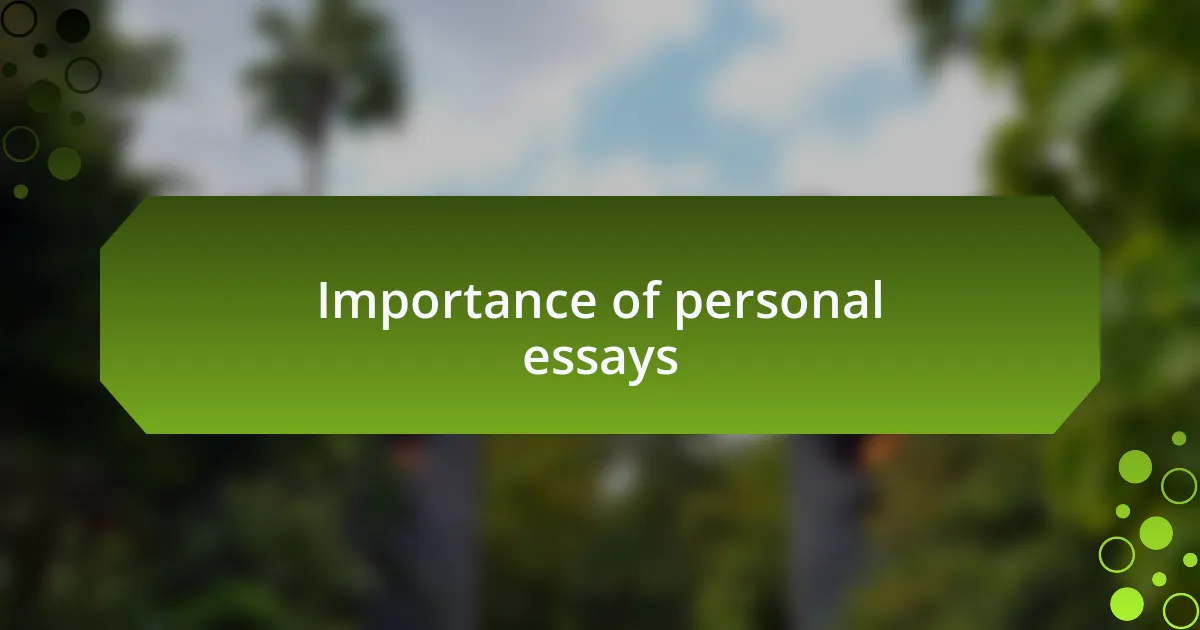
Importance of personal essays
The importance of personal essays lies in their ability to foster empathy. When we share our experiences, we invite others to see the world through our eyes. I recall a personal essay I penned about overcoming anxiety. The reactions from readers showed me how closely my struggles resonated with them, creating a sense of community through shared vulnerability.
In addition, personal essays offer a space for self-discovery. Each time I write, I confront my thoughts and feelings, often uncovering insights I didn’t know existed. Reflecting on a significant friendship, I realized just how much those moments shaped my relationships today. Have you ever thought about how a simple memory can illuminate deeper truths about who you are?
Ultimately, they serve as a bridge between the personal and the universal. Through storytelling, we highlight our unique experiences while revealing shared human emotions. I find it fascinating how a simple narrative about a family gathering can evoke feelings of nostalgia and warmth in others. In what ways do your stories connect with the lives of those around you?
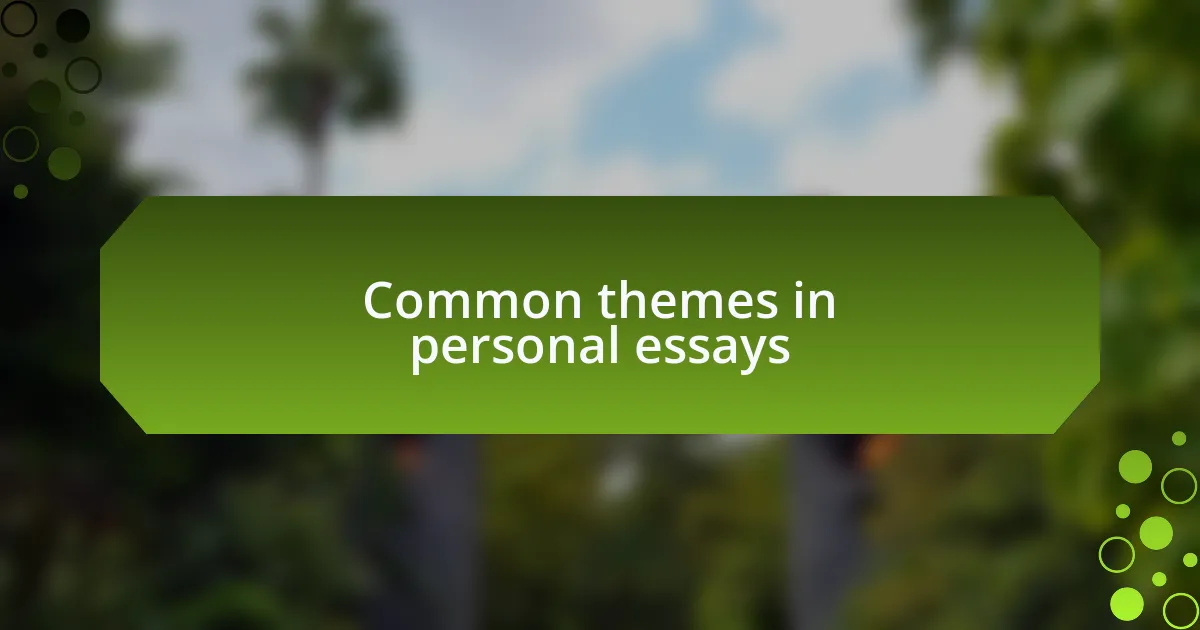
Common themes in personal essays
When I think about common themes in personal essays, one that often emerges is the theme of resilience. Many writers delve into their battles with adversity, whether it’s a health challenge or a personal loss. I remember pouring my heart into an essay where I recounted a period of joblessness. It was a tough chapter, yet acknowledging that struggle allowed me to celebrate the growth that followed. Have you faced setbacks that reshaped your journey?
Another prevalent theme is identity exploration. Personal essays give us a canvas to examine who we are and how our backgrounds influence us. I once wrote about my cultural heritage and the complex feelings that arise in the intersection of tradition and modernity. This introspection led me to appreciate the unique blend of influences that shape my worldview. What aspects of your identity have you explored in your writing?
Lastly, relationships often take center stage in personal essays. Whether it’s family dynamics or friendships, those connections reveal profound truths about ourselves. I vividly recall reflecting on a mentoring relationship that changed my life. Through writing about it, I understood the lasting impact of guidance and support. How have your relationships informed your personal narrative?
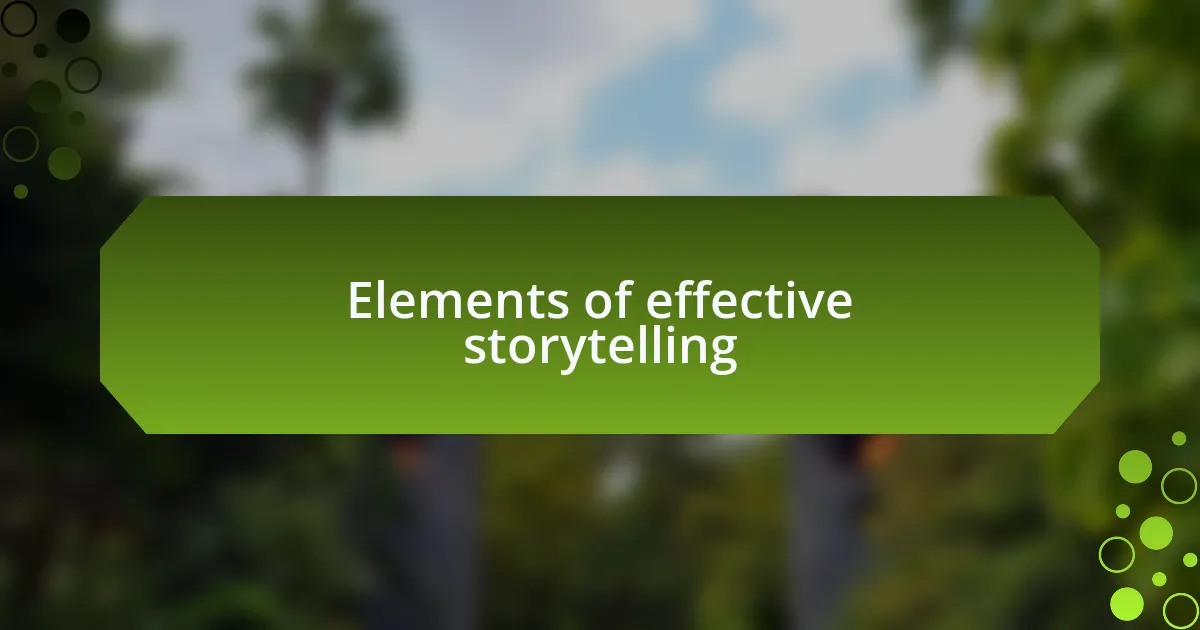
Elements of effective storytelling
Effective storytelling hinges on strong character development. I recall crafting a personal essay where I portrayed my younger self navigating the choppy waters of adolescence. By sharing my insecurities and moments of triumph, I not only made my experiences relatable but also allowed readers to empathize with my journey. Have you considered how crafting authentic characters can draw readers closer to your own narrative?
Another vital element is a well-structured narrative arc. In my experience, weaving a tale that has a clear beginning, middle, and end creates a satisfying rhythm. I remember writing about a transformative travel experience that began with excitement but was met with unexpected challenges. That journey shaped me, demonstrating how the stakes in storytelling can vividly engage an audience. What personal stories do you have that follow a similar arc?
Additionally, the use of vivid imagery can bring your story to life. When I wrote about my grandmother’s garden, I described the colors, scents, and textures that filled that space. This sensory detail made the essay not just a recollection, but an immersive experience for the reader. How can you evoke emotions in your essays through the power of imagery?

How to choose your topic
Choosing a topic for your personal essay can be both exciting and daunting. I often start by reflecting on moments in my life that stirred strong emotions or significant lessons. For instance, I once wrote about a summer spent volunteering abroad, capturing not just the joy I felt, but also the challenges that reshaped my worldview. What moments stand out in your memory, waiting to be transformed into a compelling narrative?
Consider what resonates with you. When I choose a topic, I think about what I’m passionate about—something that sparks my enthusiasm as I write. I remember diving into the theme of overcoming adversity when I shared my struggle with public speaking. This topic held personal significance for me, and that passion translated into my writing, making it more engaging. What issues ignite a fire in you?
Don’t shy away from vulnerability. I’ve found that when I delve into my fears and uncertainties, my essays reach a deeper level of connection with readers. Writing about my first heartbreak opened up a floodgate of emotions. Sharing that experience allowed others to relive similar feelings, creating a bond between my story and theirs. What vulnerabilities are you willing to explore in your own essays?
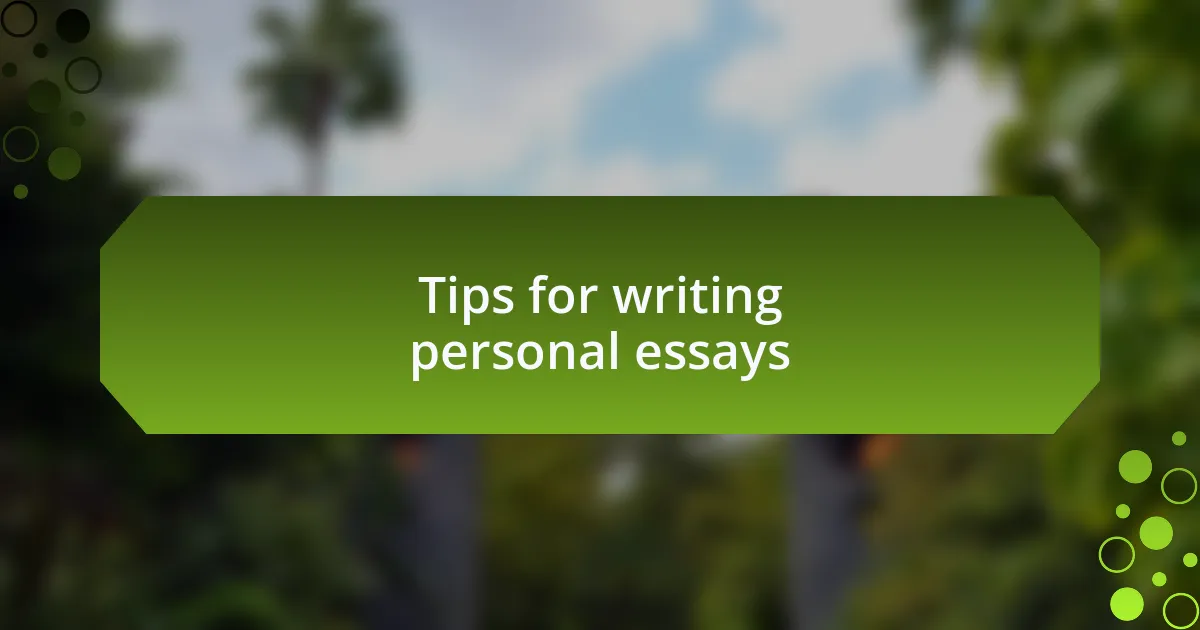
Tips for writing personal essays
When crafting your personal essay, I believe that showing rather than telling is essential. For example, instead of stating that a certain event was “important,” I would describe the sights, sounds, and feelings of that moment, like how the warm sun felt on my skin during a long-awaited reunion. This not only paints a vivid picture but also invites readers to experience the moment alongside you. What sensory details come to mind when you reflect on your own significant experiences?
Don’t underestimate the power of structure. I remember when I wrote my first personal essay, I ended up with a sprawling narrative that lost its focus. By organizing my thoughts into a clear beginning, middle, and end, I found I could guide my readers through my journey effectively. It’s like navigating a map; when you have landmarks, the journey makes more sense. What structural techniques do you find helpful in developing your own narratives?
Finally, embrace your authentic voice. I’ve noticed that when I write with my true self—quirks, humor, and all—my essays resonate more deeply. I once included a humorous mishap during a family gathering, which not only lightened the mood but also captured the essence of my family’s dynamic. This personal touch makes storytelling more relatable and engaging. What aspects of your personality do you want to shine through in your writing?
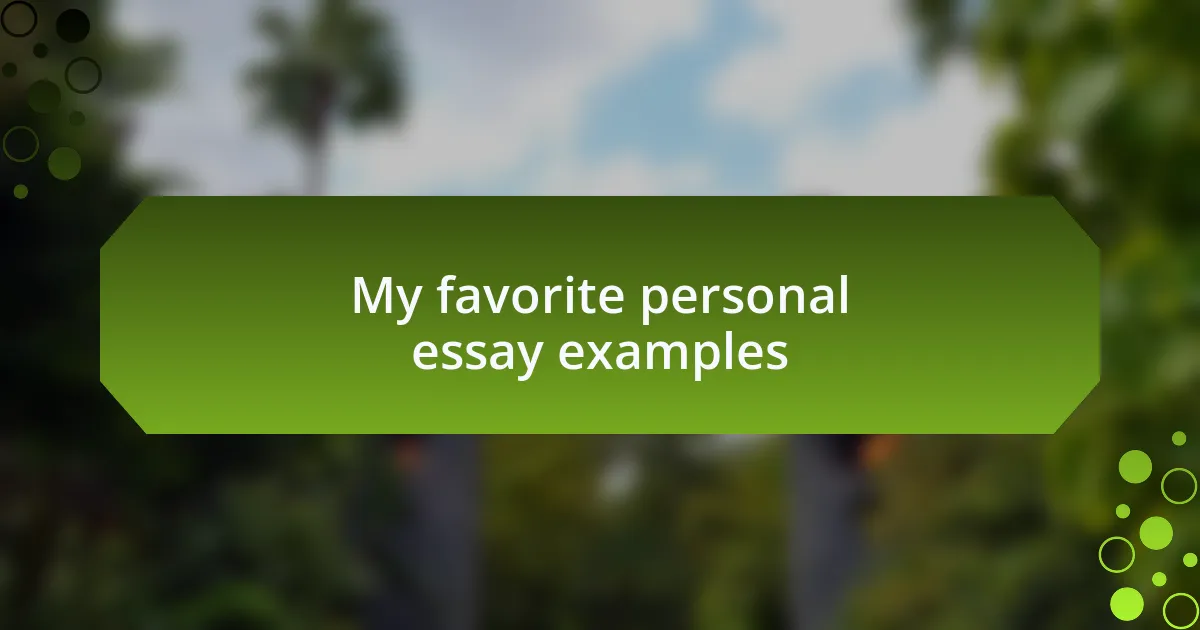
My favorite personal essay examples
One personal essay that stands out to me is “On Being a Cripple” by Nancy Mairs. Her candid exploration of living with multiple sclerosis resonated with me on a profound level. The way she intertwines her vulnerability with fierce independence challenges the reader to reflect on their own perceptions of disability. How often do we confront our biases about others’ struggles?
Another favorite of mine is “A Modest Proposal” by Jonathan Swift. Though satirical, it deeply impressed me by showcasing how personal essays can prompt readers to engage with serious topics through humor and hyperbole. It’s a reminder of how writing can both entertain and enlighten. Have you ever considered using satire to convey a message in your own work?
Lastly, I can’t ignore “The Joy of Missing Out” by Patrick Rhone. His contemplation on the beauty of self-imposed solitude struck a chord with me. In a world obsessed with constant connectivity, his reflections invite me to think about what true contentment looks like. Shouldn’t we all take a step back and consider what truly matters to us?